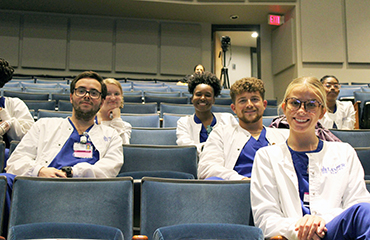
Lander University nursing students attend the Medically Speaking series to learn more about the local health care system from the doctors who work in it. Photo by Lindsey Hodges.
Not everything you learn in nursing school comes from a textbook. One source of knowledge for Lander University nursing students: straight from the doctors themselves.
Lander hosts Medically Speaking, a lecture series showcasing local doctors, and sponsors it alongside Self Regional Healthcare and the Greenwood Chamber of Commerce.
The first of three featured speakers, Dr. Bryan Green, a local board-certified gastroenterologist, recently spoke about the prevalence of early onset colorectal cancer.
“It just gives us extra information from the source,” said Miranda Carman, a junior nursing major, about attending the talk.
“Instead of reading it out of a textbook, somebody can give you the information. You can ask questions from somebody who’s definitely a reliable source, being a doctor and going through the procedures all the time instead of reading it out of a textbook or standing to the side in an observation room.”
Dr. Holisa Wharton, dean of the School of Nursing, said the faculty encourage nursing and public health students to attend Medically Speaking events. She noted that the series helps the school meet goals such as provision of coordinated care based on best evidence, population health, interprofessional partnerships, application of theory to practice and professional development.
“The presentations also help students understand the physicians' role and foster better interdisciplinary collaboration,” Wharton said.
“By just listening to the doctors explain medical conditions, students can improve their communication skills, particularly in learning how to convey critical information between healthcare professionals. The series often includes case studies and scenarios that help nursing students connect theoretical knowledge to clinical situations. Students may be inspired to pursue further education or specialized fields of nursing.”
The series, she said, gives students a broad, more nuanced perspective of the health care system and enhances their clinical knowledge, collaborative mindset and professional development.
Brianna Howard, a junior nursing student, said it is useful to get real life examples outside of a textbook.
“I love the fact that we actually get to engage with the hospital and they bring people here to us, because that just makes it more applicable to real life, rather than just the textbook,” Howard said.